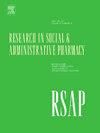The mediating role of occupational identification in the effect of occupational self-efficacy on burnout
IF 2.8
3区 医学
Q1 PUBLIC, ENVIRONMENTAL & OCCUPATIONAL HEALTH
Research in Social & Administrative Pharmacy
Pub Date : 2025-06-26
DOI:10.1016/j.sapharm.2025.06.109
引用次数: 0
Abstract
Background
Recent research has demonstrated that burnout is considerably high among community pharmacists worldwide. Researchers call for conducting research to prevent burnout among community pharmacists and take action. The current work considers this call.
Objective
This study tries to understand how burnout can be reduced among community pharmacists. To this end, it aims to fill the gap in the literature by investigating the mediating role of occupational identification in the relationship between occupational self-efficacy and burnout among community pharmacists.
Methods
The unit of analysis in this study is the individual level. To test the research model, data were collected from community pharmacists registered with the 1st Region Istanbul Chamber of Pharmacists via Google Form between July and November 2023 using the survey method. The survey was answered by 432 participants, and 383 useable data were analyzed using the Smart PLS 4 analysis program.
Results
The analysis found that both occupational self-efficacy (β = −0.187, p = 0.000) and occupational identification (β = −0.805, p = 0.000) negatively affect burnout. Furthermore, the analysis results demonstrated that occupational self-efficacy positively affects occupational identification (β = 0.165, p = 0.001). Finally, the partial mediating role of occupational identification in the relationship between occupational self-efficacy and burnout was confirmed (β = −0.133, p = 0.001).
Conclusion
The present study showed that community pharmacists with strong occupational self-efficacy fully participate in their work and, thus, occupational commitment observed through occupational identification plays an essential role in protecting against burnout. Hence it is recommended that Faculties of Pharmacy, Pharmacists' Associations, and Provincial Chambers of Pharmacists develop training that will increase self-motivation on this issue in order to improve community pharmacists’ occupational self-efficacy and occupational identification levels.
职业认同在职业自我效能感对职业倦怠的中介作用:基于社区药师的研究。
背景:最近的研究表明,职业倦怠是相当高的社区药剂师在世界各地。研究人员呼吁开展研究,防止社区药剂师的职业倦怠,并采取行动。当前的工作考虑了这一呼吁。目的:了解如何减少社区药师的职业倦怠。为此,本研究旨在通过研究职业认同在社区药师职业自我效能感与职业倦怠关系中的中介作用来填补文献空白。方法:本研究以个体层面为分析单位。为了检验研究模型,采用问卷调查的方法收集了2023年7月至11月在伊斯坦布尔第一区药剂师商会以谷歌表格注册的社区药剂师的数据。该调查由432名参与者回答,并使用Smart PLS 4分析程序分析了383个可用数据。结果:分析发现,职业自我效能(β = -0.187, p = 0.000)和职业认同(β = -0.805, p = 0.000)对职业倦怠均有负向影响。此外,分析结果显示,职业自我效能正向影响职业认同(β = 0.165, p = 0.001)。最后,证实了职业认同在职业自我效能感和职业倦怠之间的部分中介作用(β = -0.133, p = 0.001)。结论:本研究表明,具有较强职业自我效能感的社区药师充分参与工作,通过职业认同观察到的职业承诺对预防职业倦怠起着至关重要的作用。因此,建议药学院、药剂师协会和省级药剂师协会开展培训,提高在这一问题上的自我激励,以提高社区药剂师的职业自我效能感和职业认同水平。
本文章由计算机程序翻译,如有差异,请以英文原文为准。
求助全文
约1分钟内获得全文
求助全文
来源期刊

Research in Social & Administrative Pharmacy
PUBLIC, ENVIRONMENTAL & OCCUPATIONAL HEALTH-
CiteScore
7.20
自引率
10.30%
发文量
225
审稿时长
47 days
期刊介绍:
Research in Social and Administrative Pharmacy (RSAP) is a quarterly publication featuring original scientific reports and comprehensive review articles in the social and administrative pharmaceutical sciences. Topics of interest include outcomes evaluation of products, programs, or services; pharmacoepidemiology; medication adherence; direct-to-consumer advertising of prescription medications; disease state management; health systems reform; drug marketing; medication distribution systems such as e-prescribing; web-based pharmaceutical/medical services; drug commerce and re-importation; and health professions workforce issues.
 求助内容:
求助内容: 应助结果提醒方式:
应助结果提醒方式:


